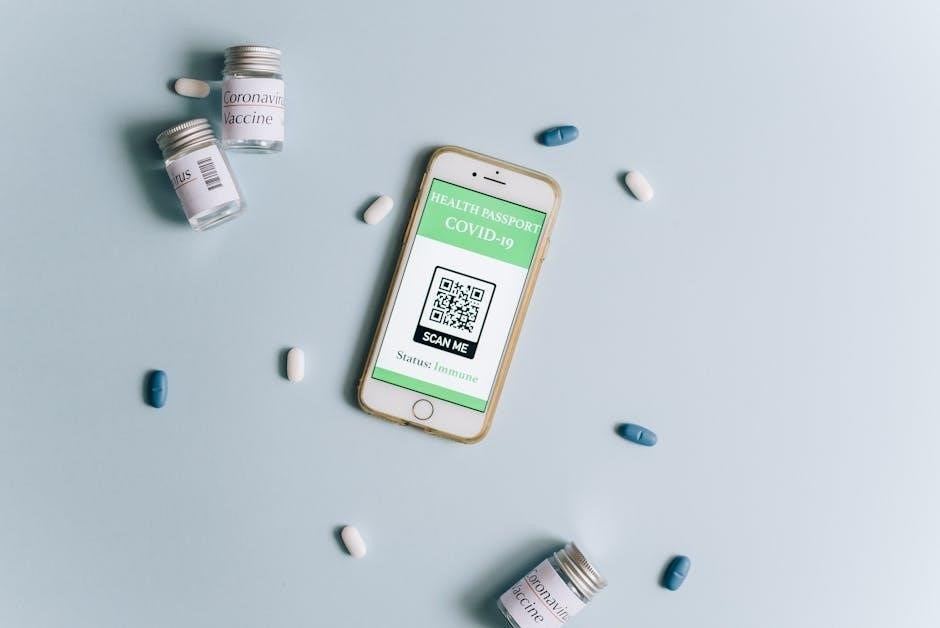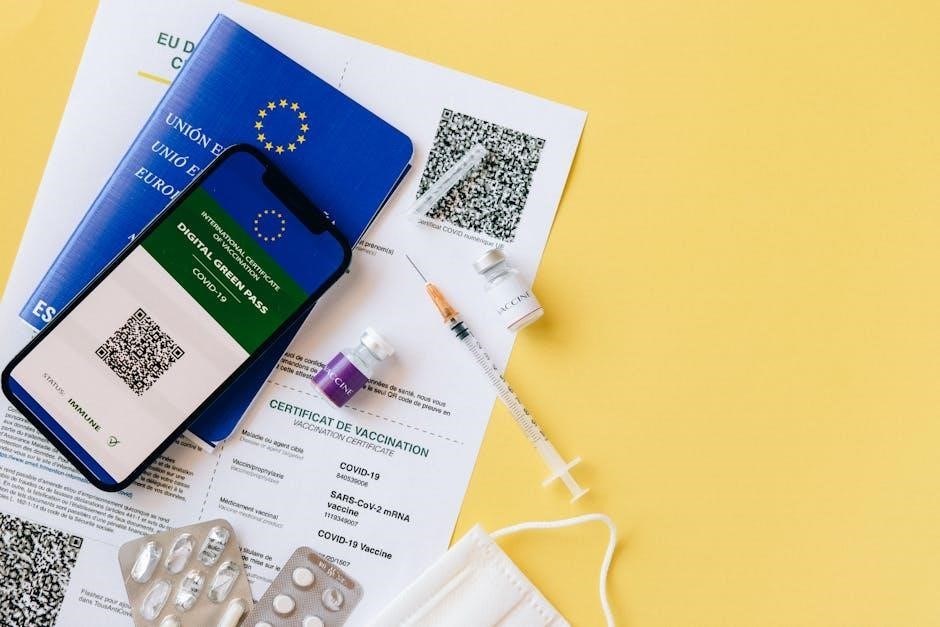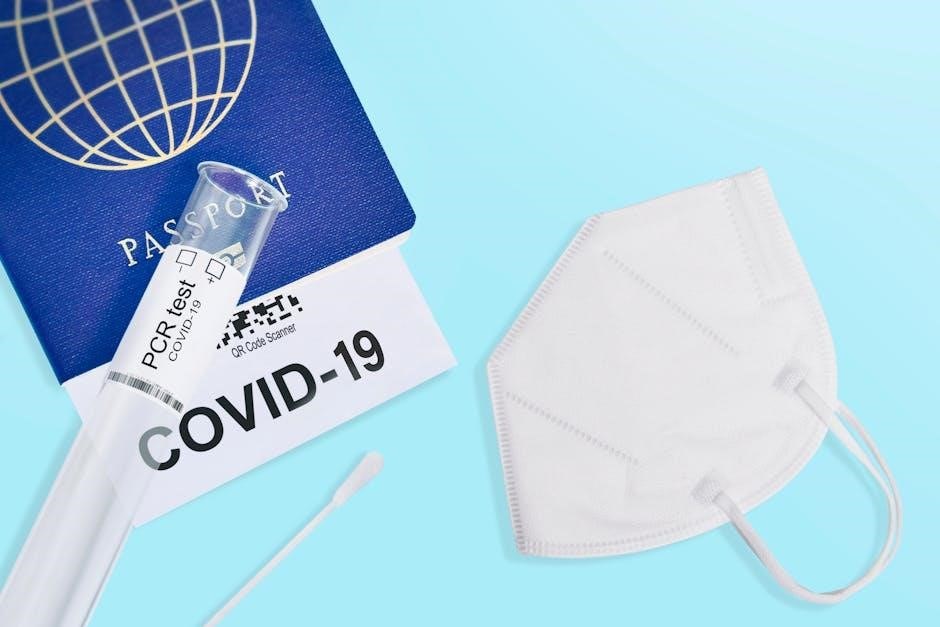medicine cards pdf
MEDICINE CARDS.pdf ─ Free download as PDF File (.pdf) or view presentation slides online. Medicine Cards by Jamie Sams offer spiritual guidance through animal symbolism, aiding self-discovery and healing. They serve as portable, wallet-sized tools for tracking medications, ensuring quick access during emergencies or healthcare visits. These cards are essential for organized health management and spiritual growth.
Definition and Purpose of Medicine Cards
A Medicine Card is a concise, portable document listing a patient’s medications, dosages, and health information. Its primary purpose is to ensure clear communication between patients, healthcare providers, and pharmacists. These cards serve as a quick reference for medical emergencies and routine care, promoting accurate medication administration. Available in digital and printable formats, Medicine Cards can be customized to include personal details, making them indispensable tools for organized health management and improved patient outcomes.
Importance of Medicine Cards in Healthcare
Medicine Cards are vital tools in healthcare, preventing medication errors and enhancing patient safety; They ensure clear communication between patients and healthcare providers, especially in emergencies. By providing a concise record of medications, dosages, and medical history, these cards improve treatment accuracy and efficiency. They are particularly crucial for individuals with chronic illnesses, offering a quick reference for caregivers. Their accessibility and portability make them indispensable in urgent situations, while their customization options ensure personalized care. Medicine Cards also support HIPAA compliance, safeguarding patient privacy while maintaining essential health information readily available.

History and Development of Medicine Cards
Medicine Cards originated from Native American traditions, symbolizing animal wisdom and spiritual guidance. Modern adaptations, like Medicine Cards PDFs, integrate health information for practical healthcare use, blending tradition with utility.
Origins of Medicine Cards in Native American Traditions
Medicine Cards trace their roots to Native American spirituality, where animals symbolize wisdom and healing. Jamie Sams’ Medicine Cards: The Discovery of Power Through the Ways of Animals popularized this tradition, offering insights through animal totems. Originally used in rituals and teachings, these cards now exist as PDFs, blending ancestral wisdom with modern accessibility. They serve as tools for self-discovery, spiritual growth, and healing, preserving the rich cultural heritage of Native American traditions while adapting to contemporary needs.
Evolution of Medicine Cards in Modern Healthcare
Medicine Cards have evolved from traditional Native American spiritual tools to modern healthcare resources. Digital versions, such as Medicine Cards PDFs, offer accessible templates for tracking medications and health information. These tools enhance patient safety, improve communication between healthcare providers, and ensure adherence to treatments. Modern Medicine Cards integrate seamlessly with digital health systems, including Electronic Health Records (EHRs), making them indispensable in contemporary medical practice. Their versatility and ease of use have made them a valuable asset in both emergency situations and routine care, ensuring accurate and efficient health management.
Key Elements of a Medicine Card
A Medicine Card includes essential medication details, dosages, frequencies, and healthcare provider contacts. It is designed to be clear, concise, and portable, ensuring quick access to critical health information.
Basic Information Included in a Medicine Card
A Medicine Card typically includes the patient’s name, list of current medications, dosages, and frequencies. It also contains information about allergies, medical conditions, and emergency contacts. Additional details may include the prescribing physician’s name, pharmacy information, and medication administration instructions. Some cards also provide space for notes on potential drug interactions or special instructions. This comprehensive yet concise format ensures that critical health information is readily accessible to healthcare providers, pharmacists, and the patient themselves. The card is designed to be portable, fitting easily into a wallet for quick reference during medical emergencies or appointments.
Structure and Design of a Medicine Card
A Medicine Card is structured to include essential medication details in a clear, organized format. It typically features a grid or table layout, with columns for medication names, dosages, frequencies, and duration. The design often includes separate sections for allergies, medical conditions, and emergency contact information. The card may also incorporate visual elements like symbols or colors to enhance readability. Its compact size ensures portability, fitting easily into a wallet. Digital versions may include QR codes linking to electronic health records, offering a modern, customizable solution for patient care.

Benefits of Using Medicine Cards
Medicine Cards improve communication between patients and healthcare providers, enhancing patient safety. They serve as a quick reference for emergencies and daily medication management.
Improved Communication Between Patients and Healthcare Providers
Medicine Cards.pdf enhance communication by providing a clear, concise record of medications, dosages, and medical history. This ensures healthcare providers can quickly understand a patient’s needs, reducing errors and misunderstandings. The portability of these cards makes them accessible during emergencies or visits to new providers, fostering efficient dialogue. Digital versions further streamline sharing, modernizing the process. This clarity and accessibility are vital for ensuring accurate care and improving patient outcomes, making Medicine Cards an invaluable tool for effective healthcare communication.
Enhanced Patient Safety and Adherence to Medications
Medicine Cards.pdf improve patient safety by providing a comprehensive record of medications, dosages, and schedules. This ensures patients take the correct doses, reducing errors and potential drug interactions. The cards also serve as a reminder for patients to adhere to their prescribed regimens. By keeping the card in a wallet, individuals can easily update it when medications change, ensuring healthcare providers have the most accurate information. This organized approach minimizes risks and enhances adherence, promoting better health outcomes and safer care. Digital versions further simplify sharing and updates, adding an extra layer of safety and convenience.
How to Create a Medicine Card
Use a Medicine Cards.pdf template to structure essential details like medications, dosages, and frequencies. Download, fill in, and customize the card for personalized health tracking and easy sharing.
Step-by-Step Guide to Making a Medicine Card
Start by downloading a Medicine Cards.pdf template, which provides a structured format for organizing medication details. Fill in the sections with your medications, dosages, and frequencies. Include any allergies, medical conditions, and emergency contact information. Customize the card to suit your needs, ensuring clarity and readability. Print the card on durable paper or save it digitally for easy access. Regularly update the card whenever your medications change. Keep it in your wallet or saved on your phone for quick reference during medical visits or emergencies, ensuring accurate communication of your health information.
Tools and Templates for Creating Medicine Cards
Various tools and templates are available to create Medicine Cards, ensuring clarity and organization. Downloadable PDF templates, such as the Med Card Template, offer structured formats for listing medications, dosages, and medical history. Platforms like Carepatron provide editable templates, allowing customization to meet individual needs. Nursing Drug Card Templates are also popular, offering detailed sections for pharmacological information. Additionally, software tools enable digital creation and easy sharing of Medicine Cards; These resources are invaluable for healthcare professionals and patients, simplifying the process of maintaining accurate and accessible medical records.
Digital Medicine Cards
Digital Medicine Cards offer convenient access to medication lists and health details via apps and online platforms, ensuring easy updates and instant sharing with healthcare providers.
Advantages of Digital Medicine Cards Over Physical Ones
Digital Medicine Cards offer enhanced accessibility and convenience compared to physical ones. They can be easily stored on smartphones or cloud platforms, ensuring instant access during emergencies or healthcare visits. Digital cards eliminate the risk of losing or damaging physical copies and allow for real-time updates when medications change. Additionally, they reduce storage space and can be shared quickly with healthcare providers. Security features like passwords protect sensitive information, and digital formats are environmentally friendly. Overall, digital Medicine Cards streamline health management, making them a practical choice for modern healthcare needs.
How to Download and Use Digital Medicine Card Templates
Downloading and using digital Medicine Card templates is straightforward. Visit reliable websites like Carepatron or Medfools, which offer free PDF or Word templates. Select the desired template, click the download button, and save it to your device. Open the file in a compatible program, fill in the required fields, such as medication names, dosages, and frequencies. Customize the template to suit individual needs, including adding personal or patient information. Save the completed document and print it if needed. Digital templates ensure easy updates and accessibility, making them a convenient option for managing health information effectively.
Medicine Cards in Emergency Situations
MEDICINE CARDS.pdf highlight their role in emergencies by providing quick access to medication details, dosages, and contact information, ensuring timely medical care and preventing life-threatening delays.
Role of Medicine Cards in Medical Emergencies
MEDICINE CARDS.pdf emphasize their critical role in emergencies by providing instant access to a patient’s medication list, dosages, and healthcare provider contacts. These portable cards ensure healthcare providers can quickly understand a patient’s medical needs, reducing delays and errors. In crisis situations, such as unresponsive states or rapid deterioration, the card serves as a vital communication tool. Its accessibility in wallets or purses makes it easily retrievable, ensuring timely and appropriate care. This simple yet effective document is indispensable for safeguarding patient safety and facilitating swift medical interventions during emergencies.
How to Ensure Your Medicine Card is Easily Accessible
To ensure your Medicine Card is easily accessible, carry it in a wallet or purse, and store a digital version on your smartphone. Keep a backup copy in a secure location, like a cloud storage service, and inform family members or caregivers of its whereabouts. Consider having multiple copies in different places, such as your car or workplace, to guarantee availability during emergencies. This ensures that critical medical information is always within reach, providing peace of mind and facilitating prompt care when needed.

Medicine Cards for Specific Needs
MEDICINE CARDS.pdf offers customizable solutions for chronic illnesses, pediatrics, and geriatrics, ensuring tailored medical information and accessibility for diverse patient needs and conditions.
Medicine Cards for Chronic Illnesses
MEDICINE CARDS.pdf ─ Free download as PDF File (.pdf) or view presentation slides online. Medicine Cards are vital for managing chronic illnesses, offering a centralized tool to track complex medication regimens, dosages, and treatment plans. They provide clarity for patients and healthcare providers, reducing errors and ensuring adherence. Customizable templates allow users to include symptoms, test results, and emergency contacts. Digital versions enable easy updates and sharing, making them indispensable for long-term care. These cards empower patients to take control of their health, fostering better communication and improved outcomes.
Medicine Cards for Pediatric and Geriatric Patients
MEDICINE CARDS.pdf ─ Free download as PDF File (.pdf) or view presentation slides online. Medicine Cards are particularly beneficial for pediatric and geriatric patients, who often require precise medication tracking. For children, they ensure accurate dosages and simplify communication with caregivers. For the elderly, they help manage multiple prescriptions and prevent drug interactions. Customizable templates cater to their unique needs, with features like enlarged text for better readability. These cards also include space for caregiver instructions, ensuring continuity of care. They are essential tools for safeguarding the health of vulnerable populations.

Customizing Your Medicine Card
Customize your Medicine Card with personal details, colors, and symbols for better understanding. Add specific sections like allergies or emergency contacts to enhance functionality and accessibility.
Adding Personalized Information to Your Medicine Card
Personalize your Medicine Card by including specific details such as your name, medications, dosages, and frequencies. Add known allergies, medical conditions, and emergency contacts for clarity. Include your healthcare provider’s information and any relevant medical history. You can also list dietary restrictions or preferences. This ensures that your card is tailored to your unique needs, making it a reliable resource for healthcare providers. Using a digital template allows easy updates and organization of information, ensuring accuracy and accessibility during emergencies or routine care.
Using Colors and Symbols for Better Understanding
Medicine Cards often incorporate colors and symbols to enhance comprehension and engagement. Colors can highlight critical information, such as allergies or dosages, making it easier to identify key details at a glance. Symbols, like animal imagery in Native American traditions, convey deeper meanings and spiritual connections. These visual elements simplify complex medical information, ensuring quick understanding during emergencies. By combining text with visuals, Medicine Cards become more accessible and user-friendly, fostering better communication between patients and healthcare providers while preserving cultural and spiritual significance. This approach makes the cards both practical and meaningful for diverse user needs.
Legal and Privacy Considerations
Medicine Cards must comply with HIPAA regulations to protect patient privacy. Ensuring secure storage and sharing practices prevents unauthorized access to sensitive medical information.
Ensuring HIPAA Compliance with Medicine Cards
MEDICINE CARDS.pdf ⎻ Free download as PDF File (.pdf) or view presentation slides online. Ensuring HIPAA compliance with Medicine Cards requires encrypting digital files and securely sharing patient information. Healthcare providers must obtain patient consent before accessing or sharing Medicine Card data. Physical cards should be stored in secure locations to prevent unauthorized access. Regular audits and staff training on HIPAA guidelines are essential to maintain compliance. By adhering to these protocols, Medicine Cards can safely store and transmit sensitive medical information without violating patient privacy rights.
Protecting Patient Privacy When Sharing Medicine Cards
Protecting patient privacy when sharing Medicine Cards involves encrypting digital files and using secure platforms for transmission. Ensure patient consent is obtained before sharing any medical information. Access to Medicine Cards should be limited to authorized healthcare providers. Physical cards must be stored securely to prevent unauthorized access. Implement policies for handling lost or stolen cards to safeguard sensitive data. Regular audits and staff training on privacy practices are essential to maintain confidentiality. By prioritizing patient privacy, Medicine Cards can be shared safely while respecting individual rights and adhering to legal standards.

Medicine Cards in Clinical Practice
MEDICINE CARDS.pdf ⎻ Free download as PDF File (.pdf) or view presentation slides online. Medicine Cards enhance clinical practice by providing structured, portable tools for tracking medications, dosages, and patient histories. They aid healthcare professionals in understanding drug administration, ensuring accurate and efficient care delivery. These cards are invaluable for nurses, students, and clinicians, offering a clear and concise format for essential medical information in clinical settings.
Using Medicine Cards During Hospital Rounds
Medicine Cards are invaluable during hospital rounds, serving as portable tools for quick access to patient medication lists, dosages, and schedules. They enable healthcare teams to review and discuss treatment plans efficiently, ensuring clarity and consistency in care delivery. By providing a standardized format, Medicine Cards reduce errors and save time, allowing clinicians to focus on patient outcomes. Their use fosters improved communication among healthcare providers, enhances patient safety, and streamlines the rounding process. Additionally, they serve as a reliable reference for nurses and physicians, ensuring accurate medication reconciliation and adherence to treatment protocols during hospital stays.
Integrating Medicine Cards into Electronic Health Records
Integrating Medicine Cards into Electronic Health Records (EHRs) enhances patient care by linking digital medication lists with medical histories. This seamless connection allows healthcare providers to access comprehensive medication details directly within EHR systems. Digital Medicine Cards can be securely uploaded or attached to patient profiles, ensuring real-time updates and reducing manual data entry. This integration improves accuracy, streamlines communication, and supports better decision-making during clinical practice. Tools like Carepatron enable easy uploading of Medicine Cards to EHRs, making them accessible to all healthcare team members and fostering efficient patient management.

Medicine Cards as Educational Tools
Medicine Cards serve as valuable educational tools, aiding nursing students and healthcare professionals in understanding drug administration and improving clinical practice through structured medication information.
Teaching Patients About Their Medications Using Medicine Cards
Medicine Cards are effective tools for educating patients about their medications, ensuring they understand dosage instructions and potential interactions. By listing current medications, dosages, and frequencies, these cards promote clear communication between patients and healthcare providers. They also empower patients to take an active role in their health management. The portability of Medicine Cards allows patients to carry vital information in their wallets, ensuring accessibility during emergencies or doctor visits. This approach enhances patient understanding, improves adherence to treatment plans, and fosters better health outcomes. Additionally, digital versions can be easily updated and shared, making them a convenient option for modern healthcare.
Educational Resources for Healthcare Professionals
Healthcare professionals can utilize free downloadable templates and PDFs, such as the Med Card Template, to enhance their understanding of medication administration. These resources provide detailed drug information, clinical prompts, and structured formats for notes. Nursing students and professionals benefit from pharmacology cards, care plans, and concept maps, which are available for immediate printing or digital use. Printable medication list templates and educational tools, like those from Carepatron, offer organized ways to track patient data, improving clinical practice and patient care. These resources are invaluable for both education and practical application in healthcare settings.

Medicine Cards and Technology
Technology transforms medicine cards into digital tools, offering apps and online platforms to streamline medication management. Downloadable PDF templates and EHR integrations enhance accessibility and efficiency for healthcare professionals.
Apps and Software for Managing Medicine Cards
Various apps and software tools are available to manage medicine cards digitally, enhancing organization and accessibility. Platforms like Carepatron offer customizable templates that can be edited and saved online. These tools allow patients to store medication lists, dosages, and physician contacts securely. Apps enable real-time updates and sharing with healthcare providers, improving communication and adherence. Digital solutions also integrate with electronic health records (EHRs), streamlining data management. Additionally, downloadable PDF templates from sites like Medfools provide printable options for easy reference. These technologies empower patients and professionals to maintain accurate, accessible medication records, fostering better health outcomes and efficiency in care delivery.
The Future of Medicine Cards in Digital Health
The future of medicine cards lies in advanced digital health solutions, with apps and software enabling seamless management of medication records. AI-driven tools will enhance personalization, offering tailored medication reminders and dosage alerts. Integration with electronic health records (EHRs) will improve data sharing between patients and providers. QR codes linked to digital medicine cards could become standard, ensuring instant access during emergencies. Secure platforms will prioritize patient privacy through encryption. As technology evolves, digital medicine cards will play a pivotal role in streamlining healthcare communication, fostering better patient outcomes, and reducing errors in medication management.
MEDICINE CARDS.pdf ─ Free download as PDF File (.pdf) or view presentation slides online. Medicine Cards by Jamie Sams offer spiritual guidance through animal symbolism, aiding self-discovery and healing. They serve as portable, wallet-sized tools for tracking medications, ensuring quick access during emergencies or healthcare visits. These cards are essential for organized health management and spiritual growth.
MEDICINE CARDS.pdf highlights the significance of these tools in healthcare and spirituality. They serve as organized, portable records of medications, ensuring accessibility during emergencies or medical visits. Beyond practical use, Medicine Cards by Jamie Sams offer spiritual guidance through animal symbolism, fostering self-discovery and healing. Their compact, wallet-friendly design makes them indispensable for health management. The availability of free PDF downloads further enhances their accessibility, making them invaluable for both medical and spiritual purposes. These cards bridge traditional wisdom with modern healthcare needs, promoting holistic well-being and efficient communication between patients and providers.
Final Thoughts on the Future of Medicine Cards
MEDICINE CARDS.pdf suggests a promising future for these tools, blending traditional wisdom with modern innovations. As digital health evolves, Medicine Cards may integrate with apps and EHRs, enhancing accessibility and functionality. Their spiritual and practical benefits, rooted in Native American traditions, will likely see increased adoption in holistic healthcare practices. Customizable templates and digital versions ensure they remain relevant, providing patients and professionals with concise, portable health information. The future of Medicine Cards lies in their adaptability, offering a bridge between ancient wisdom and contemporary healthcare needs, ensuring continued utility and spiritual guidance.

